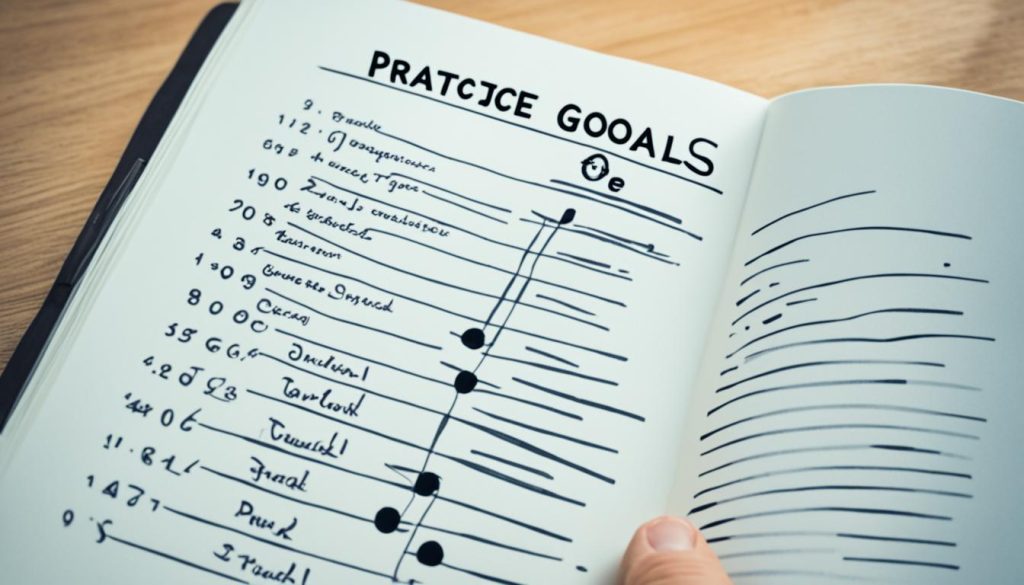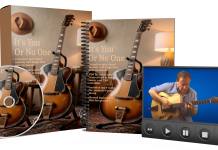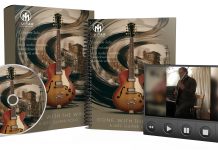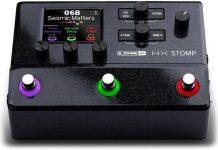This post may contain affiliate links. As an Amazon associate, Google associate as well as associate for other programs, Guitar & Music Institute may earn commissions from qualifying purchases.
 Do you often feel you’ve hit a brick wall with your guitar playing and musical development? If so, this article is for you. Learn how to optimize your practice time and get the most from organized and thought through schedules to revolutionize your playing development.
Do you often feel you’ve hit a brick wall with your guitar playing and musical development? If so, this article is for you. Learn how to optimize your practice time and get the most from organized and thought through schedules to revolutionize your playing development.
Key Takeaways:
- Create a practice routine to maximize your guitar practice time.
- Plan your practice sessions in advance and focus on specific goals.
- Use a timer to stay focused and engaged during practice.
- Regularly change your routine to prevent plateauing and maintain motivation.
- Set specific goals for each practice session to track your progress.
The Importance of a Practice Routine
Many guitar players mistakenly believe that the amount of time spent practicing is the most important factor in improving their skills. While time is important, it is not the only factor. The quality of your practice is equally important. By planning your practice routine and eliminating distractions, you can make the most of your practice time and see better results.
When it comes to guitar practice, having a structured and effective practice routine is key to making progress. A practice routine provides you with a roadmap of what to work on and ensures that you cover all the necessary areas to become a well-rounded player.
A well-designed guitar practice schedule helps you stay organized and focused. It allows you to allocate time to various aspects of guitar playing, such as technique, theory, repertoire, and improvisation.
Moreover, a practice routine helps you build consistency. Regular, structured practice sessions are more effective than sporadic, haphazard practice. By dedicating specific time slots to practice, you can establish a habit and make steady progress over time.
By incorporating different exercises and techniques into your practice routine, you can target specific areas for improvement. This ensures that you’re not just playing the same things over and over but actively working on advancing your skills.
In addition, a practice routine allows you to track your progress. By setting specific goals and measuring your improvement over time, you can stay motivated and see the tangible results of your hard work.
The Benefits of a Structured Practice Routine:
- Optimal use of practice time
- Improved focus and concentration
- Targeted skill development
- Consistent progress
- Increased motivation
- Goal achievement
Remember, having a guitar practice routine doesn’t mean you have to follow a rigid schedule every day. It’s important to allow flexibility and adapt your routine as needed. The goal is to create a structured framework that guides your practice sessions and maximizes your progress.
So, if you’re serious about improving your guitar skills, take the time to develop an effective practice routine. Plan your practice sessions, set specific goals, and be consistent in your efforts. With a well-designed practice routine, you’ll be on your way to becoming the guitarist you’ve always envisioned.
Creating a Practice Schedule
To optimize your guitar practice sessions and make the most of your time, it’s crucial to create a well-structured practice schedule. By planning your practice routine in advance, you can ensure that you cover all the necessary areas of development and work towards your long-term goals.
When creating your practice schedule, consider planning for one week at a time. This allows you to have a clear roadmap and focus on different aspects of guitar playing each week. Here are some essential areas you may include in your practice schedule:
- Technique: Devote time to refining your fingerpicking, strumming, bending, vibrato, and other essential guitar techniques.
- Aural Skills: Improve your ability to recognize and reproduce musical intervals, chords, scales, and melodies by incorporating ear training exercises into your practice routine.
- Sight Reading: Enhance your reading skills by practicing sight-reading exercises and playing music from sheet music.
- Improvisation: Develop your improvisational skills by exploring different scales, modes, chord progressions, and experimenting with melodic ideas.
- Fretboard Knowledge: Dedicate time to memorizing scales, arpeggios, and understanding the relationship between notes on the guitar neck.
Remember to align your practice schedule with your long-term goals. If you aspire to become a proficient jazz guitarist, allocate more time to improvisation exercises and studying jazz harmony. If your goal is to become a session guitarist, prioritize sight-reading and learning different playing styles.
It’s also important to adjust the length of time you spend on each skill according to its significance in achieving your overall objectives. For example, if sight-reading is a weak area for you, allocate more practice time to it to improve your reading abilities.
Sample Practice Schedule for a Week
| Day | Practice Areas | Time Allocation |
|---|---|---|
| Monday | Technique & Aural Skills | 60 minutes |
| Tuesday | Sight Reading & Improvisation | 45 minutes each |
| Wednesday | Technique & Fretboard Knowledge | 60 minutes |
| Thursday | Sight Reading & Aural Skills | 45 minutes each |
| Friday | Improvisation & Aural Skills | 30 minutes each |
| Saturday | Technique & Fretboard Knowledge | 60 minutes |
| Sunday | Rest | – |
A practice schedule ensures that you cover all the essential skills and areas of development to become a well-rounded guitarist. It gives you direction and helps you stay disciplined in your practice routine, which ultimately leads to progress and improvement in your playing.
Using a Timer
One of the most effective ways to optimize your guitar practice schedule and ensure structured practice sessions is by using a timer. By incorporating timed intervals into your practice routine, you can stay focused, maintain discipline, and maximize the effectiveness of your practice time.
Here’s how using a timer can help:
Create Time Blocks
Divide your practice session into specific time blocks to allocate dedicated focus to different aspects of your playing. For example, you can set aside 10 minutes for scales and technique exercises, another 10 minutes for chord progressions, and 15 minutes for learning new songs. By setting time limits for each task, you create a structured practice timetable for musicians.
Stay Engaged and Concentrated
Setting the timer to beep at regular intervals, such as every minute, can serve as a gentle reminder to stay engaged in your practice. This can prevent your mind from wandering and help you concentrate on the task at hand. By consciously focusing on the practice and eliminating distractions, you improve the quality of your practice sessions.
Build Concentration Span
Using a timer also helps you gradually extend your concentration span. Start with shorter intervals, such as five or ten minutes, and gradually increase the duration as you build your ability to maintain focus. Over time, you’ll find that you can concentrate for longer periods, leading to more productive and immersive practice sessions.
Track Your Progress
Timing your practice sessions allows you to keep track of how much time you spend on specific exercises or skills. This gives you valuable insight into your progress and helps you maintain a consistent practice schedule. By monitoring your practice time, you can identify areas where you may need to allocate more or less time, ensuring a well-balanced and effective practice routine.
Incorporating a timer into your guitar practice routine can transform your practice sessions into focused, structured, and effective learning experiences. By setting time blocks, staying engaged, building your concentration span, and tracking your progress, you can make the most of your practice time and achieve your musical goals.
Changing Your Routine
When it comes to improving your guitar skills, sticking to the same practice routine can lead to stagnation. To prevent plateauing and maintain motivation, it’s crucial to change up your practice routine regularly. By doing so, you can keep your practice sessions fresh and continue making progress.
As you start practicing something new, you’ll likely experience significant progress in the beginning. However, over time, that progress may taper off as you become more comfortable with the material. This is where changing your routine becomes essential.
By tweaking or completely changing the items in your practice routine, you challenge yourself to learn new techniques, explore different musical styles, or delve deeper into a specific aspect of guitar playing. This keeps your practice sessions exciting and helps you continually push your boundaries.
When changing your routine, consider incorporating the following strategies:
- Explore new genres: Experiment with different musical genres to expand your horizons and develop a well-rounded skill set.
- Focus on specific techniques: Target specific techniques, such as alternate picking or fingerstyle playing, to refine your skills in those areas.
- Learn new songs: Challenge yourself by learning songs that are different from your usual repertoire. This can expose you to new chord progressions, melodies, and musical ideas.
- Try improvisation: Incorporate improvisation exercises into your routine to enhance your creativity and develop your ear for music.
Remember, the key is to keep your practice sessions engaging and enjoyable. By embracing variety in your routine, you’ll stay motivated and continue to see improvements in your guitar skills.

| Benefits of Changing Your Routine |
|---|
| 1. Prevents plateauing by challenging your skills |
| 2. Maintains motivation and enthusiasm for practice |
| 3. Expands your musical horizons by exploring new genres and techniques |
| 4. Enhances creativity and improvisation skills |
Setting Specific Goals
Setting specific goals is a crucial component of an effective guitar practice routine. By defining clear objectives for each practice session, you can track your progress, stay motivated, and continuously improve your guitar skills.
When setting goals, it’s important to be specific and realistic. Aim for achievable milestones that challenge you without being overwhelming. Consider your current skill level and choose goals that push you to improve, but are still within reach.
Examples of Specific Goals:
- Increase the tempo of a scale exercise by 10 beats per minute
- Master a difficult chord progression in a particular song
- Improve accuracy and speed in playing a complex guitar riff
- Learn and apply a new guitar technique, such as fingerpicking or bending
By setting specific goals, you give yourself a clear target to work towards during each practice session. This focus helps you stay motivated and provides a sense of accomplishment when you achieve your goals. Additionally, setting specific goals allows you to measure your progress over time and make adjustments to your practice routine as needed.
Remember to break down bigger goals into smaller, manageable steps. This makes the process more manageable and allows you to celebrate smaller victories along the way.
| Advantages of Setting Specific Goals: | Disadvantages of Vague Goals: |
|---|---|
|
|
Setting specific goals not only helps you improve your guitar skills, but also adds structure and purpose to your practice routine. It keeps you on track, pushing you to consistently strive for excellence.
Using a Practice Journal
Keeping a practice journal is an effective way to track your progress and stay motivated on your guitar journey. By recording your daily exercises and achievements, you can visually see your growth over time and gain insight into areas where you may need improvement. Using a practice journal helps you stay accountable to your guitar practice schedule and provides a valuable reference for setting new goals.
Here’s how to make the most of your practice journal:
- Document your daily exercises: Write down the specific exercises and techniques you practiced each day. This allows you to keep a record of what you worked on and track your progress in different areas of your guitar playing.
- Track your achievements: Make a note of any breakthroughs, milestones, or challenges you overcame during your practice sessions. Celebrating your accomplishments boosts motivation and helps you stay focused on your guitar goals.
- Reflect on your struggles: Use your practice journal to identify any areas where you may be struggling or encountering difficulties. This allows you to pinpoint specific challenges and plan targeted practice sessions to address them.
- Set new goals: Review your practice journal regularly to set new goals and objectives. Whether it’s learning a new song, mastering a challenging technique, or improving your speed, setting realistic and measurable goals will keep you motivated and focused.
- Monitor your progress: Look back on past entries in your practice journal to see how far you’ve come. Witnessing your progress can be incredibly inspiring and reinforce your commitment to your guitar practice routine.
Remember, a practice journal is a personal tool to help you optimize your guitar practice schedule and improve your skills. Make it a habit to write in your journal after every practice session, and you’ll reap the benefits of increased motivation, clearer focus, and accelerated progress.

Guitar Practice Journal Example
| Date | Exercises | Achievements | Struggles |
|---|---|---|---|
| Day 1 | Warm-up, scales in G major, chord progressions | Successfully played “Smoke on the Water” | Struggled with barre chords |
| Day 2 | Fingerstyle patterns, arpeggios, song practice | Improved speed on fingerstyle patterns | Had trouble with timing on arpeggios |
| Day 3 | Technique exercises, ear training, improvisation | Mastered palm muting technique | Found improvisation challenging |
Recording Practice Sessions
Recording your practice sessions is an invaluable tool for improving your guitar skills. By capturing your playing and listening back to the recordings, you can identify areas for improvement and track your progress over time. Here’s how you can make the most of recording your practice sessions:
1. Pay Attention to Technique, Timing, and Sound
When listening to your recordings, focus on analyzing your technique, timing, and overall sound. Pay attention to your hand position, picking technique, finger placement, and any areas where you might be struggling. Observe your timing and rhythmic accuracy, ensuring that you’re playing in time with the metronome or backing track. Evaluate the overall tone and sound quality to ensure that you’re achieving the desired tone and making the most of your equipment.
2. Take Notes for Improvement
While listening to the recordings, take notes on what is working well and what needs improvement. Identify specific areas where you can make adjustments and set goals for further practice. For example, you might notice inconsistencies in your picking technique or difficulties with a particular chord transition. Write these observations down so that you can address them in future practice sessions and track your progress.
3. Guide Future Practice Sessions
Use the information gathered from your recordings to guide your future practice sessions. Focus on the areas that need improvement and design targeted exercises to address them. Break down challenging passages into smaller parts and practice them slowly and gradually increase the tempo. By incorporating the feedback from your recordings into your practice routine, you can effectively target your weaknesses and make significant progress in your guitar skills.
By recording your practice sessions, you can gain valuable insights into your playing and accelerate your improvement. It allows you to objectively evaluate your technique, identify areas for growth, and track your progress over time. Make this tool a regular part of your guitar practice routine and watch your skills improve.
Conclusion
A well-designed guitar practice schedule is the key to enhancing your proficiency and accelerating your progress. By optimizing your practice routine, setting specific goals, using a timer, changing your routine regularly, and utilizing practice journals and recordings, you can make the most of your practice time and improve your guitar skills.
Consistency and dedication to your practice schedule are essential in achieving your goals as a musician. With a structured and effective practice routine, you can develop the necessary techniques, expand your musical knowledge, and refine your playing style. Remember, it’s not just about the amount of time spent practicing, but rather the quality and focus of your practice sessions.
By setting clear goals, utilizing tools such as timers and practice journals, and regularly reviewing your progress through recordings, you can stay motivated and track your improvement along the way. Embrace the challenge of exploring new practice methods and materials, and don’t be afraid to adjust your routine to keep it fresh and engaging.
So, whether you’re a beginner or an experienced guitarist, take control of your musical journey by designing an effective guitar practice schedule. With dedication and perseverance, you’ll be amazed at how much you can achieve and how quickly you can progress in mastering the guitar.
FAQ
What is the importance of having a guitar practice schedule?
Having a guitar practice schedule helps maximize your practice time and improve your skills. It allows you to plan your practice sessions in advance, focus on specific goals, and eliminate distractions.
How do I create a practice schedule for guitar?
To create a practice schedule, plan your routine one week at a time. Choose different areas to focus on each week, such as technique, aural skills, sight reading, improvisation, and fretboard knowledge. Adjust the length of time you spend on each skill based on your long-term goals.
How can using a timer during practice sessions be beneficial?
Using a timer helps you stay focused and make the most of your practice time. By setting intervals, such as every minute, the timer reminds you to concentrate and stay engaged. This improves your ability to concentrate for longer periods and enhances the effectiveness of your practice routine.
Why is it important to change my practice routine regularly?
Changing your practice routine prevents plateauing and maintains motivation. When you practice something new, you see significant progress in the beginning, but it tapers off over time. By changing or tweaking items in your routine, you keep your sessions fresh and continue to make progress.
What is the significance of setting specific goals for each practice session?
Setting specific goals helps track your progress and stay motivated. Whether it’s increasing the tempo of a scale or mastering a difficult chord progression, having targets to reach allows you to measure your success and make adjustments to your practice routine as needed.
How can a practice journal be helpful in improving my guitar skills?
Keeping a practice journal allows you to track your progress and stay motivated. By recording your daily exercises and achievements, you can see tangible results over time. The journal also helps identify areas where you may be struggling and allows you to set new goals and track your progress.
Why should I record my practice sessions?
Recording your practice sessions helps track your progress and identify areas for improvement. By listening back to your recordings, you can pay attention to your technique, timing, and overall sound. Taking notes on what is working well and what needs improvement guides your future practice sessions.
How can a well-designed guitar practice schedule enhance my skills?
A well-designed practice schedule maximizes your proficiency and accelerates your progress. By optimizing your routine, setting specific goals, using a timer, changing your routine regularly, and utilizing practice journals and recordings, you can make the most of your practice time and improve your guitar skills.
Source Links
- https://www.guitarlessonsgeauga.com/new-page.html
- https://www.mwgcourses.com/p/guitar-practice-routine
- https://nationalguitaracademy.com/guitar-practice-schedule/
This post may contain affiliate links. As an Amazon associate, Google associate as well as associate for other programs, Guitar & Music Institute may earn commissions from qualifying purchases.



















